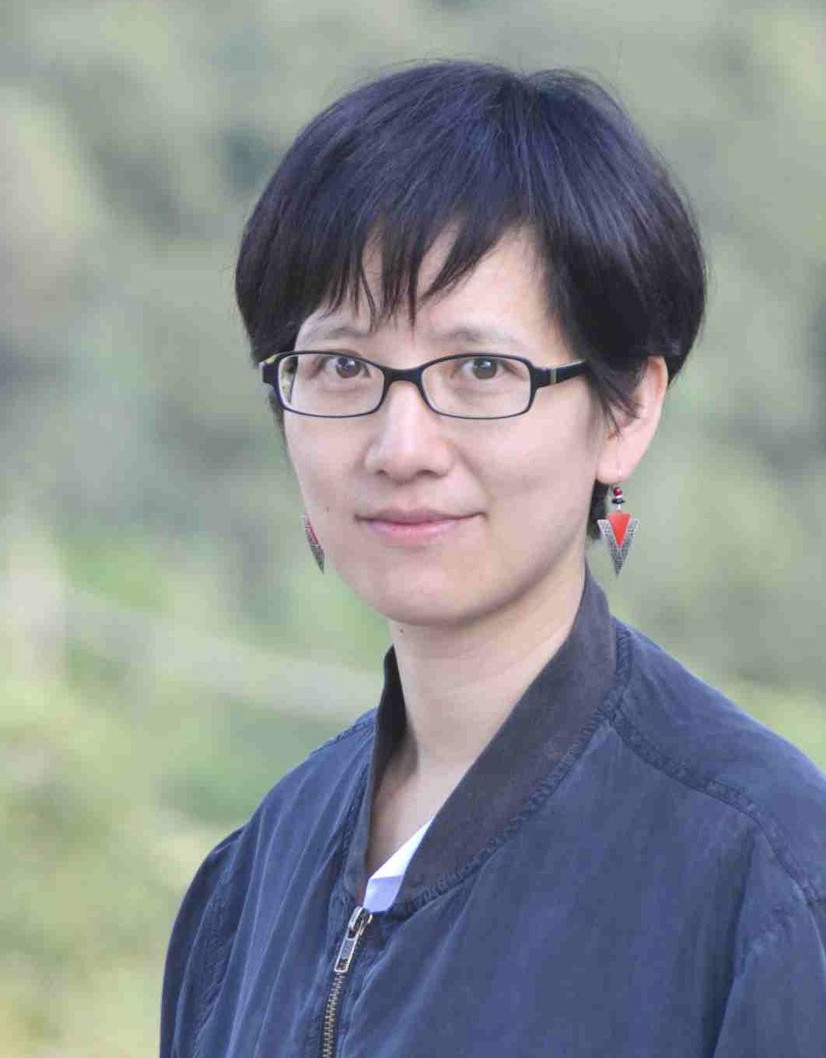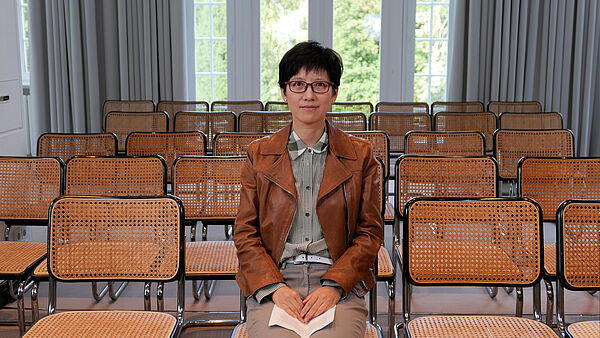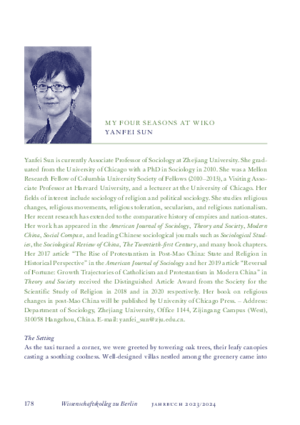
Yanfei Sun, Ph.D.
Associate Professor of Sociology
Zhejiang University, Hangzhou
Born in 1976 in Zhejiang, China
Studied Sociology at the University of Chicago
Arbeitsvorhaben
Premodern Empires and Religious Toleration: A Historical Comparative Study
Existing studies of empires emphasize the high capacity of premodern empires to stomach and skillfully exploit religious, ethnic, linguistic, and cultural diversities. They thereby belie the fact that premodern empires displayed vast differences in the handling of religious diversity in their territories – while some empires allowed all kinds of religions to flourish, other empires persecuted heretics and nonbelievers and carried out forced conversion. During my stay at the Wissenschaftskolleg zu Berlin, I will work on my book manuscript that seeks to map and explain the variations among more than 30 selected premodern Eurasian empires in their level of toleration of different religions. This book manuscript will argue that a premodern empire’s level of toleration of different religions is not primarily determined by the state capacity, geopolitics, or the specific attributes of the religious ecology in that empire, but by the nature of the state religion installed by the premodern empire. It will further argue that an empire tended to be intolerant when its state religion had a zero-sum mentality (zero-sumness) toward other religions and a strong conversion drive (evangelicalness).Zero-sum evangelical state religions could lead to religious wars, inquisitions, religious persecution, and forced conversion. These were commonplace in premodern Europe where Christianity, a quintessential zero-sum evangelical religion, reigned. Yet, it was also in this land of extreme religious intolerance that the modern ideologies of religious liberty were born. The book manuscript will reflect on this great paradox of history.
In the age of secularism, the political influence of zero-sum evangelical religions seemed to have waned. Yet, the zero-sum/evangelical mentality continues to profoundly shape the world we live in, manifesting itself in various secular ideologies and movements, when their advocates still think in a true/false or right/wrong binary mode and strive for hegemony.
Recommended Reading
Sun, Yanfei (2014). “Popular Religion in Zhejiang: Feminization, Bifurcation, and Buddhification.” Modern China 40 (5): 455–487.
— (2017). “The Rise of Protestantism in Post-Mao China: State and Religion in Historical Perspective.” American Journal of Sociology 122 (6): 1664–1725.
— (2019). “Reversal of Fortune: Growth Trajectories of Catholicism and Protestantism in Modern China.” Theory and Society 48 (2): 267–298.
Kolloquium, 09.04.2024
Religiöse Toleranz in vormodernen Imperien: Zwischen pragmatischen Grundeinstellungen und ideologischen Zwängen
Angesichts der unerwünschten oder sogar fatalen Folgen, die das Streben nach kultureller Homogenität im Aufbauprozess moderner Nationalstaaten mit sich bringt, würdigt die Forschung inzwischen die weitgehende religiöse, ethnische, sprachliche und kulturelle Vielfalt vormoderner Imperien. Insbesondere staunt sie über die Fähigkeit vormoderner Imperien, eine Politik der Differenz zu verfolgen, und betont deren Tendenz zur Toleranz gegenüber heterogenen Religionen und Kulturen auf ihren eigenen Territorien.
Diese Betonung täuscht jedoch über die Tatsache hinweg, dass die Religionspolitik der vormodernen Imperien sehr unterschiedlich war: Während einige tatsächlich alle Arten von Religionen zuließen und gedeihen ließen, wurden in anderen Imperien Ketzer und Ungläubige verfolgt und zur Konversion gezwungen.
In diesem Vortrag untersuche ich die wichtigsten vormodernen Imperien Eurasiens und versuche, die variierenden Muster ihrer Politik gegenüber verschiedenen Religionen aufzuzeichnen. Anhand meiner Kriterien der religiösen Toleranz versuche ich, diese vormodernen Imperien verschiedenen Stufen zuzuordnen. Nach einer Begutachtung einschlägiger Theorien stelle ich meine eigene Theorie vor, in der ich den Schwerpunkt auf die Eigenschaften der Religion bzw. des Glaubenssystems lege, das ein Imperium als Staatsreligion angenommen hat. Darüber hinaus schlage ich ein Schema vor, um die Eigenschaften von Staatsreligionen zu analysieren.
In meinem Vortrag beleuchte ich ein Dilemma der vormodernen Imperien. Sie dehnten sich zwar auf einem riesigen Gebiet aus, das von Menschen unterschiedlicher Ethnien, Sprachen, Religionen und Kulturen bevölkert wurde, doch die wenig leistungsfähige Infrastruktur vormoderner Imperien – bedingt durch das Fehlen einer effizienten Verwaltung sowie moderner Transport- und Kommunikationsmittel – führte dazu, dass die Imperien ihren Einflussbereich nicht auf die lokalen und grenznahen Gesellschaften ausdehnen konnten, ohne von den lokalen Eliten unterstützt zu werden. Daher hielten es pragmatisch denkende Herrscher vormoderner Imperien für eine vernünftige Option, lokale Vielfalt, auch religiöse Vielfalt, zu akzeptieren. Doch diese Politik der religiösen Toleranz konnte auch die zentrifugalen Tendenzen regionaler Eliten verstärken. Für die Herrscher vormoderner Imperien bestand also ein Anreiz, eine einzige Religion oder Glaubenssystem als Staatsideologie anzunehmen und zu fördern. Die Etablierung einer Ideologie führt jedoch dazu, dass die Strategien des Staates im Umgang mit Religionen unter Umständen stark eingeschränkt werden mussten, und hinderte den Staat daran, bei Bedarf eine eher pragmatische Politik gegenüber religiösen Minderheiten zu verfolgen.
Zum Schluss möchte ich aufzeigen, wie vormoderne Imperien in die Falle ihrer eigenen Legitimationsideologie gerieten oder in ihr gefangen blieben. Natürlich ist diese Geschichte keineswegs nur auf vormoderne Imperien beschränkt.
Publikationen aus der Fellowbibliothek
Sun, Yanfei (Dordrecht [u.a.], 2019)
Reversal of fortune : growth trajectories of Catholicism and Protestantism in modern China
Sun, Yanfei (Chicago, Ill., 2017)
The rise of protestantism in post-Mao China : state and religion in historical perspective
Sun, Yanfei (London, 2014)
Popular religion in Zhejiang : feminization, bifurcation, and Buddhification

